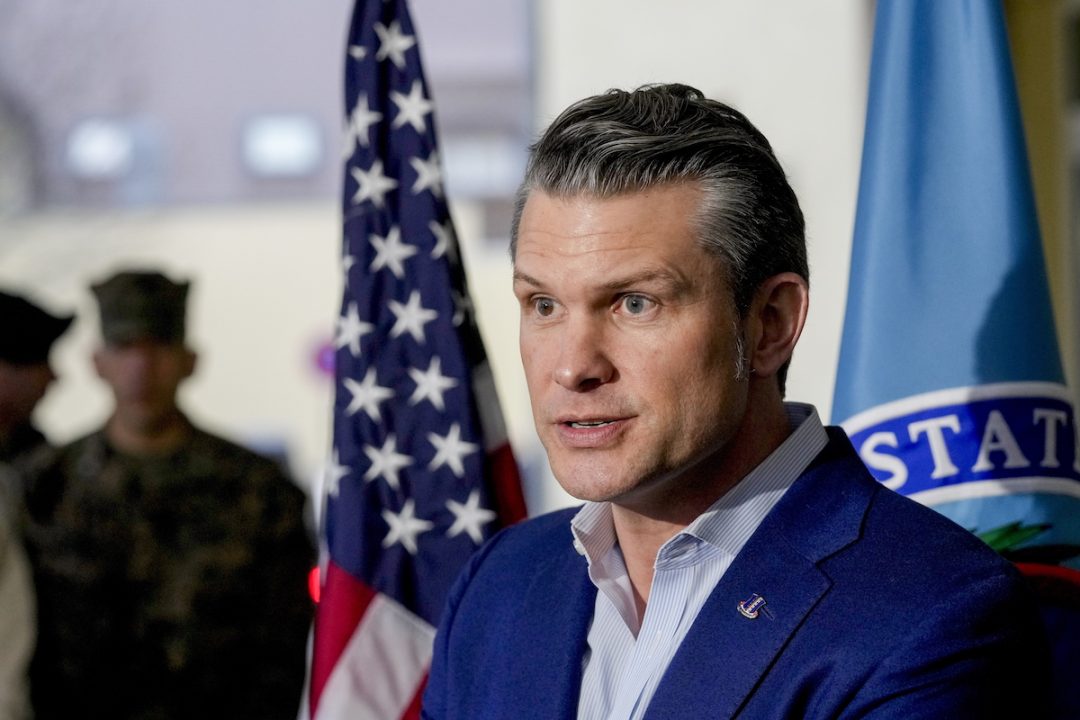
For those still hoping the Pentagon might trim its spending, Secretary of Defense Pete Hegseth delivered a different kind of news on Tuesday. Speaking at U.S. European Command (EUCOM) headquarters in Stuttgart, Germany, Hegseth made it clear that his idea of “cutting waste” has little to do with spending less — and everything to do with spending more “efficiently.”
Hegseth told the press that he’s “talking” and “in partnership,” with Elon Musk and his team at the U.S. Department of Government Efficiency (DOGE). The secretary “welcomed” DOGE at DOD, positioning the initiative as a way to address “headcounts, waste and redundancy.” As an example of the latter, Hegseth referenced “climate programs,” which he dismissed as distractions from the military’s real mission. “We’re in the business of deterring and winning wars,” he stressed.
Instead of cuts, Hegseth promised a modernized military, where savings are redirected not back to taxpayers, but to “warfighters.” “Acquiring weapons systems” and improving procurement is where DOGE would help the Pentagon, Hegseth said. He added, “Every dollar we save will go to the warfighters — and that’s good for the American people.”
Hegseth did not address Musk’s conflicts of interest, including his simultaneous roles as a military supplier, government contractor, and private-sector tech mogul. But those concerns can wait. There are more weapons to buy, after all — especially with President Trump pitching a boost in defense spending.
“Great Opportunity” for the Military-Industrial Complex
For defense contractors, DOGE isn’t disrupting the system — it’s optimizing it. While marketed as a crackdown on waste, the initiative seems more focused on streamlining procurement while ensuring the money keeps flowing.
According to Quartz’s recent report,
“We think this is a really good thing,” TransDigm (TDG) CEO Kevin Stein said on a recent earnings call, calling DOGE a “great opportunity” to streamline procurement at the Department of Defense (DOD) and Defense Logistics Agency (DLA).
Lockheed Martin’s CEO echoed that sentiment, describing DOGE as an “opportunity” to simplify acquisitions.
DOGE’s allies in Congress — including some Democrats — have long criticized the Pentagon’s bureaucratic inefficiencies, pointing to seven consecutive failed audits as proof that procurement is slow, bloated, and outdated. The Government Accountability Office (GAO) recently found that the Pentagon’s procurement system moves at a glacial pace. At the same time, the Stimson Center estimates that at least $60 billion in inefficiencies could be eliminated by cutting workforce bloat and scrapping “dysfunctional or unnecessary” weapons systems.
With a $895 billion annual budget, the Pentagon remains the world’s largest source of government spending. Over half of the money goes directly to private contractors.
More Bang for the Buck
Indeed, no one in the defense industry expects fewer contracts — only faster ones. The focus is on extracting more from the money already in play rather than reducing spending.
As quoted by Quartz:
“We are in a geopolitically very difficult environment where … we’re just not moving fast enough,” Booz Allen Hamilton CEO Horacio Rozanski said on an earnings call. “[T]here’s a real desire in the department both by the incoming team and by the existing professionals there, to accelerate things.”
Booz Allen Hamilton, a longtime Pentagon favorite, has secured billions in contracts for systems engineering, space defense, cybersecurity, and military aviation.
Another big winner? The ever-controversial Palantir, the CIA-backed data analytics firm co-founded by Trump ally Peter Thiel. Palantir has been embedded in the defense and intelligence sectors for years, raking in billions in Pentagon contracts for AI-driven surveillance, intelligence, and battlefield analytics.
DOGE’s push to cut red tape and accelerate procurement plays directly into Palantir’s hands. CEO Alex Karp has embraced DOGE’s agenda, calling it a “revolution” that will “expose things that aren’t working.”
Palmer Luckey, founder of defense technology company Anduril and a longtime Trump backer, is equally enthusiastic. He told CNBC last November that Trump’s approach to defense spending would favor “the right companies.”
Musk himself boosted Luckey on X. He wrote in November about how “very important” it was for the Pentagon to contract “companies like [Anduril].”
Anduril, specializing in AI-powered autonomous drones, surveillance tech, and counter-drone systems, is already deep in Pentagon contracts. With DOGE in play, it stands to gain even more.
Contractors Aligning With DOGE
The expectation of free-flowing Pentagon cash is already driving industry moves.
General Atomics Aeronautical Systems, maker of the Predator drone, sent Musk a letter in January, urging him to reform the Pentagon’s procurement process.
L3Harris CEO Chris Kubasik has also submitted recommendations. One of them includes limiting contractors’ ability to challenge contract awards, a change that would favor bigger, well-connected firms like his.
L3Harris, a key defense supplier, specializes in electronic warfare, secure communications, munitions, and aircraft modernization — all areas poised for growth under DOGE’s streamlined procurement model.
And it’s not just legacy players. Silicon Valley’s defense startups are eagerly anticipating a Pentagon more willing to embrace smaller, high-tech firms, as reported by Forbes shortly after the election.
Musk’s Growing Influence
And then there’s Elon Musk himself. Once an outsider to the defense industry, he has now cemented his role as a major Pentagon contractor. According to Reuters, Musk’s companies have secured billions of dollars in deals that blend national security, private enterprise, and high-tech military innovation.
SpaceX alone holds $22 billion in government contracts, with NASA accounting for $15 billion of that. Meanwhile, Starlink is already embedded in U.S. military operations, including a $23 million contract to provide battlefield connectivity in Ukraine.
But Starshield, SpaceX’s classified military satellite division, signals Musk’s deepening entrenchment in defense. Backed by intelligence agencies, it is estimated to be worth billions.
With DOGE dismantling procurement barriers, Musk is no longer just a supplier — he’s becoming a power broker in military spending.
New Power Bloc
And Musk isn’t acting alone. As his influence in military spending grows, a new alliance of tech firms is emerging to challenge the traditional defense giants. Palantir, Anduril, OpenAI, and SpaceX are reportedly in talks to form a consortium aimed at securing Pentagon contracts, according to the Financial Times.
Their focus? AI-driven autonomous warfare — a direct challenge to Lockheed Martin, Northrop Grumman, Boeing, and RTX, who have long dominated defense spending with traditional weapons programs.
The “Efficiencies” of War
With Hegseth expecting Musk’s DOGE to start “very soon,” a rapid rollout of the AI-powered reform of the nation’s defense in inevitable. No doubt, Musk and DOGE will parade DEI cuts and climate program eliminations as proof of their “big wins” in cutting waste. But, much like the USAID scandals, the real story won’t be in the headlines — expect loud claims of accountability while defense contracts quietly expand, and both the usual and new players cash in.
So, what’s really being built? A dystopian battlefield powered by AI, autonomous drones, and algorithmic warfare. Fewer soldiers, more machines. Software deciding who lives and dies. Warfare that is faster, colder, and more detached than ever before. A future where conflicts are managed remotely, with minimal political cost and no real accountability.
And here lies the real issue. The goal should not be to make war more efficient — it should be to end it. Yet with war becoming cheaper, faster, and automated to a degree never seen before, the incentive to stop it vanishes. Trump campaigned on stopping “forever wars,” but what happens when war is no longer a burden? When it can be waged indefinitely, with minimal risk to those pulling the strings? With players such as Musk, Karp, and Luckey at the helm, war isn’t ending — it’s just evolving into a high-tech, relentlessly efficient machine.
Related:
Reprogramming the Republic: Musk’s Quiet AI Takeover of Federal Power





